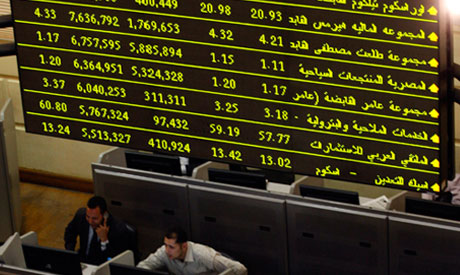
Workers at Egypt's stock exchange market are seen in the trading hall in Cairo, Egypt. 13 April, 2011 (Photo: AP)
Egyptian investors surged back onto the country's stock market on Tuesday, sending turnover rocketing to its highest level in months and the main index firmly into the green.
Total trade reached LE975.9 million ($160.19m) while the benchmark EGX30 climbed 1.63 per cent to close at 5,697.5 points.
''The considerable increase of turnover reflects the new feeling of security among investors," Hani Tawfiq, head of the Arab Union for Direct Investment, told Ahram Online.
He attributed the new-found confidence to this week's Cairo visit by a delegation of major American businessmen headed by US Deputy Secretary of State Thomas Nides.
A Chinese delegation is expected at the beginning of 2013.
From the 185 stocks traded on Tuesday, 145 gained in value and 35 declined.
The broader-based EGX70 performed even better than the main index, surging 2 per cent.
The financial sector continued to lead the market, with trade in investment bank EFG-Hermes hitting LE82.9 million and its shares closing a solid 2.54 per cent up.
Commercial International Bank, long a bellwether of foreign investor interest, saw heavy interest too, with its shares gaining 1.29 per cent.
Property firms weren't far behind. The Amer Group, which develops high-end resorts in Egypt and beyond, saw gains of 5.13 per cent. Troubled firms Palm Hills and the Talaat Moustafa Group finished 6.5 and 3.8 per cent, respectively.
"Real estate is a reassuring investment especially if there are fears over the devaluation of the local currency while the profits of the financial sector are connected to market performance," said Tawfiq.
Just over 70 per cent of trade was from domestic investors, who bought LE31.39 million more stocks than they sold. Non-Arab foreigners, by contrast, closed as net sellers.
Egyptian institutions continued their recent trend to be the market's driving force, in an apparent sign of renewed confidence in the local economy.
The Egyptian exchange was closed for seven weeks in the wake of the early 2011 uprising. When it reopened on 23 March, daily turnover took a sustained plunge. In the Mubarak era, trade typically topped LE2 billion. By mid-2011 it had fallen to LE200 million.
Short link: